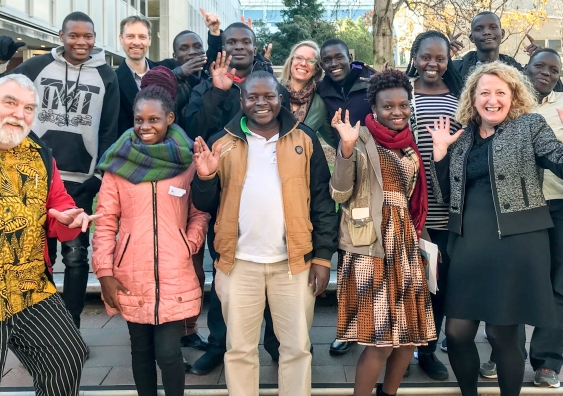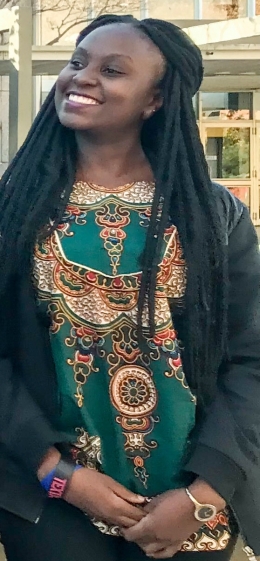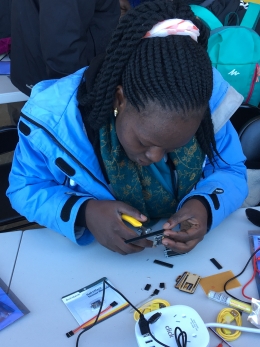Gulu University students discover new technologies on tour with UNSW
Students from Gulu University were quick to see the value of lessons learnt during the latest exchange with UNSW Sydney.
Students from Gulu University were quick to see the value of lessons learnt during the latest exchange with UNSW Sydney.

Louise Caldicott
UNSW External Communications
0435 800 395
l.caldicott@unsw.edu.au
Student Sentamu David Davis is eager to return home to Uganda and turn life around for his grandparents’ subsistence farming community, after two weeks of learning about Australian agricultural practices during an exchange program with UNSW Sydney, supported through UNSW's Faculty of Engineering and Institute for Global Development.
Davis is one of nine students and two staff visiting UNSW from Gulu University in Uganda, one of four initiatives in a partnership between the two universities to help transform health care and develop leadership, communities and student experiences in the developing African nation.
Leading the exchange, UNSW Associate Professor Julian Cox said: “The aim of the exchange program is to provide students from both universities with opportunities to learn from each other, academic staff and communities during short-term mobility experiences. I took 10 UNSW Engineering students to Gulu last year to observe farming practices and suggest innovations, and hosting Gulu students right now is the return visit.”
The students, from Gulu University’s Faculty of Agriculture and Environment, have engaged in a wide variety of activities since arriving in Sydney, including hands-on workshops with UNSW Engineering staff and students, and spending time at farms in the Boorowa area to learn about modern farming practices.

“I have learnt a lot about solar from UNSW Engineering – there is so much potential for solar applications in Uganda”: Victoria Nakayiza, biosystems engineering student.
Davis has learnt many things he wants to take back to Uganda. “My grandparents are peasant farmers. They work so hard for so little money and don’t understand all the elements of agriculture and how they could move beyond subsistence farming. I see their challenges and problems and I thought I have to do something to help and this is why I study agriculture.
“When I was in [grade] three, a guy came and bought a sack of beans from my grandparents for such little money, it would not cover half of the time and effort that they put into growing them. From that point, I knew I needed to learn how to bridge the gap between the farmers and the middle men – to help them understand why they are doing what they are doing to try to change things and improve their situation.
“The problem in my village is how to keep the soil fertile and productive. Compared with Uganda, the soil in Australia is relatively infertile, but when we went to Charlie Arnott’s farm we learnt a unique innovation where they fill cow horns with soil and manure and leave it for some time before they spread it on top of the existing soil as fertiliser.
“I’ve also learnt that using machines in agriculture can do the work of 100 people and it’s cheaper. You only need two people to manage a 500-hectare farm - we’d need a community to govern that farm in Uganda. I want to educate people back home to use mechanisation in farming. But the first thing I’ll do when I go back is to deliver a lecture to my classmates and tell them all these things.”
Victoria Nakayiza, a biosystems engineering student, spoke about the moment she found out she would be going to Australia.
“[Lecturer] Mr Kule came to our classroom and announced who was going. He called out Emmanuel’s name and I instinctively yelled, ‘Gender balance!’ – I’m the only girl in my course – and then he said my name. I thought that this was probably a prank but I’ll go with it.”
Coming to Australia was the first time Nakayiza and anyone in the group had been on an aeroplane.
“This trip has changed my view of everything. So many things I thought were impossible and I’ve now seen them done. For example, I saw your buses running on natural gas. I have also learnt a lot about solar from UNSW Engineering – there is so much potential for solar applications in Uganda. We have a lot of sun!

Student Topista Afoyorwoth at work during one of the workshops.
“Most of our learning in Uganda is theory,” said Nakayiza. “We have a lot of theory but at UNSW I’ve been learning how to apply it. At the farm last week, we learnt how to build sensors and it’s quite simple. We also made a Segway – and it actually worked. I could control it with my phone. As soon as I go back I will teach my class to build a sensor. If I can apply that practical kind of skill to my classes that would be brilliant.”
In conversation at lunch with the Ugandan students, UNSW Vice-President of External Relations and Strategic Sponsor of the Institute for Global Development Fiona Docherty said: “Gulu University is still a young institution and we are thrilled to be supporting it as it develops its role in training community and academic leaders of the future. I hope these students can share what they’ve learnt here at UNSW Sydney with their community and also put some of their learnings into practice after graduation.”
Professor Cox said he hoped that the students would be inspired by what they had seen and would use their experiences to develop a brighter future for Uganda.
Asked what memories he would take back about Australia, Davis said: “I will tell my friends about the extreme organisation of the people of Australia. Crossing the road: even if no one is there, the cars stop [at a red light]. I was amazed by this – I will definitely remember that.”